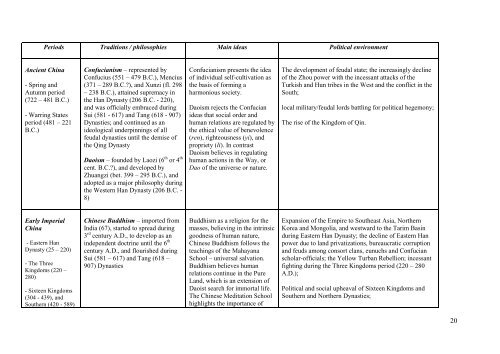The challenge of academic writing for Chinese students within ...
The challenge of academic writing for Chinese students within ...
The challenge of academic writing for Chinese students within ...
You also want an ePaper? Increase the reach of your titles
YUMPU automatically turns print PDFs into web optimized ePapers that Google loves.
Periods Traditions / philosophies Main ideas Political environment<br />
Ancient China<br />
- Spring and<br />
Autumn period<br />
(722 – 481 B.C.)<br />
- Warring States<br />
period (481 – 221<br />
B.C.)<br />
Confucianism – represented by<br />
Confucius (551 – 479 B.C.), Mencius<br />
(371 – 289 B.C.), and Xunzi (fl. 298<br />
– 238 B.C.), attained supremacy in<br />
the Han Dynasty (206 B.C. - 220),<br />
and was <strong>of</strong>ficially embraced during<br />
Sui (581 - 617) and Tang (618 - 907)<br />
Dynasties; and continued as an<br />
ideological underpinnings <strong>of</strong> all<br />
feudal dynasties until the demise <strong>of</strong><br />
the Qing Dynasty<br />
Daoism – founded by Laozi (6 th or 4 th<br />
cent. B.C.), and developed by<br />
Zhuangzi (bet. 399 – 295 B.C.), and<br />
adopted as a major philosophy during<br />
the Western Han Dynasty (206 B.C. -<br />
8)<br />
Confucianism presents the idea<br />
<strong>of</strong> individual self-cultivation as<br />
the basis <strong>of</strong> <strong>for</strong>ming a<br />
harmonious society.<br />
Daoism rejects the Confucian<br />
ideas that social order and<br />
human relations are regulated by<br />
the ethical value <strong>of</strong> benevolence<br />
(ren), righteousness (yi), and<br />
propriety (li). In contrast<br />
Daoism believes in regulating<br />
human actions in the Way, or<br />
Dao <strong>of</strong> the universe or nature.<br />
<strong>The</strong> development <strong>of</strong> feudal state; the increasingly decline<br />
<strong>of</strong> the Zhou power with the incessant attacks <strong>of</strong> the<br />
Turkish and Hun tribes in the West and the conflict in the<br />
South;<br />
local military/feudal lords battling <strong>for</strong> political hegemony;<br />
<strong>The</strong> rise <strong>of</strong> the Kingdom <strong>of</strong> Qin.<br />
Early Imperial<br />
China<br />
- Eastern Han<br />
Dynasty (25 – 220)<br />
- <strong>The</strong> Three<br />
Kingdoms (220 –<br />
280)<br />
- Sixteen Kingdoms<br />
(304 - 439), and<br />
Southern (420 - 589)<br />
<strong>Chinese</strong> Buddhism – imported from<br />
India (67), started to spread during<br />
3 rd century A.D., to develop as an<br />
independent doctrine until the 6 th<br />
century A.D., and flourished during<br />
Sui (581 – 617) and Tang (618 –<br />
907) Dynasties<br />
Buddhism as a religion <strong>for</strong> the<br />
masses, believing in the intrinsic<br />
goodness <strong>of</strong> human nature,<br />
<strong>Chinese</strong> Buddhism follows the<br />
teachings <strong>of</strong> the Mahayana<br />
School – universal salvation.<br />
Buddhism believes human<br />
relations continue in the Pure<br />
Land, which is an extension <strong>of</strong><br />
Daoist search <strong>for</strong> immortal life.<br />
<strong>The</strong> <strong>Chinese</strong> Meditation School<br />
highlights the importance <strong>of</strong><br />
Expansion <strong>of</strong> the Empire to Southeast Asia, Northern<br />
Korea and Mongolia, and westward to the Tarim Basin<br />
during Eastern Han Dynasty; the decline <strong>of</strong> Eastern Han<br />
power due to land privatizations, bureaucratic corruption<br />
and feuds among consort clans, eunuchs and Confucian<br />
scholar-<strong>of</strong>ficials; the Yellow Turban Rebellion; incessant<br />
fighting during the Three Kingdoms period (220 – 280<br />
A.D.);<br />
Political and social upheaval <strong>of</strong> Sixteen Kingdoms and<br />
Southern and Northern Dynasties;<br />
20


